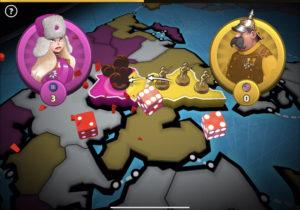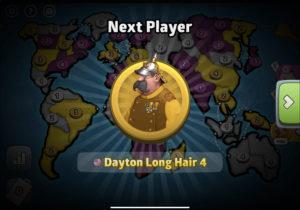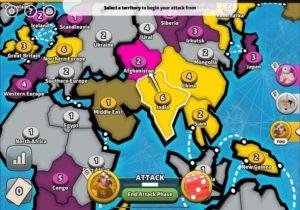We designed a social card game themed around genetically modifying chickens. Our game has a build phase and a battle phase. Players in the battle phase use card upgrades gained during the build phase to attack other players. The battle mechanics are based on the number of chickens you have and how strong in attack and defense each of those chickens is. This type of combat with other players is similar to Risk.
Risk was originally a board game (adapted to online play as RISK: Global Domination) focused on amassing armies, conducting diplomacy, engaging in combat, and ultimately trying to conquer the world. It will be important to find out how Risk makes combat fun and gameplay and actions intuitive for players.
In Risk, players receive new troops every turn to deploy to their territories. After deploying troops to their territories, players can then attack other players’ territories. Players can choose to “blitz” which automatically rolls dice until one side is defeated, or they can roll dice individually. It was surprising to find during playtesting that this slower mechanic can add excitement to the combat since there is an element of chance that you will win when you have few troops or lose when you have many.

Risk appeals to competition, fantasy, and even some fellowship. Players compete for world domination and act as generals, but you can also form alliances with other players to take over the world together!
The game blends a light, cartoonish design with explosions and artwork that mimic actual battles. This pushes players deeper into the fantasy aspect while making competition more intense since it feels real. The game doesn’t get too serious, though, because of the visual choices, which makes it easier to focus on just enjoying the game and being with friends.

Compared to other games in the genre such as Settlers of Catan, Risk has a different theme and lends itself to be faster-paced with built-in turn timers. By ensuring players don’t monopolize playing time, more players can be involved without becoming bored or feeling left out.
In the online version, it’s possible for random players to team up against you immediately from the start. With your opponents avoiding conflict with each other, you are tasked with facing an army of twice the size. This situation could happen randomly, or if friends are playing together against you. Either way, this behavior leads to unenjoyable experiences for players not forming immediate alliances. I would suggest balancing this by introducing “Act of God” events that support players who are in a losing position within a few rounds of the start. This would allow all players time to amass an army and devise a strategy.
Lastly, although Risk may seem complex with its multiple battle stages, it ended up being fairly intuitive, with arrows showing what action you had to perform, a stage indicator at the top, and clear visual effects indicating the results of your actions.



